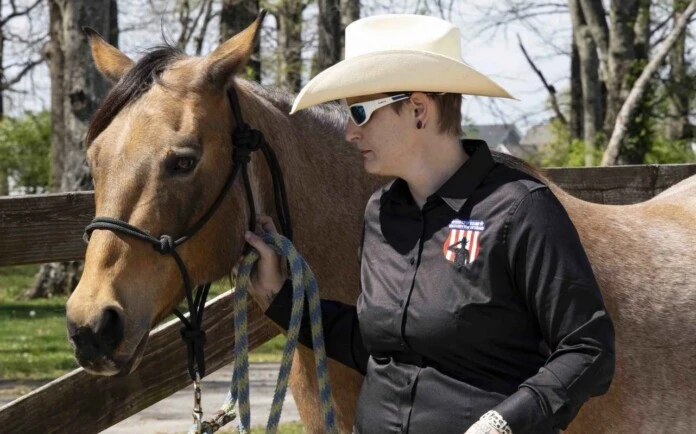In Tennessee, the U.S. Department of Veterans Affairs is achieving notable success with the time-honored approach of equine therapy. The department recently highlighted some of the inspiring results from using the therapeutic power of horses to address past traumas.
One shining example is Joanne Parchetta, who has found profound healing through the Center for Equine Recovery (CERV) at Middle Tennessee State University. This program invites veterans from the Tennessee Valley VA to engage with horses, learning about their behaviors and, in turn, discovering more about themselves. The essence of the program lies in the horses’ acute emotional sensitivity, which necessitates that participants remain calm and centered to ensure safe interactions. As one class organizer put it, horses act as “big bio-feedback machines” that reflect one’s emotional state.
Parchetta shared her experience: “I know that chronic illness or physical disability doesn’t define you, but it can be disheartening and make you feel like giving up. This class with horses showed me that I can still achieve and dream.”
According to CERV, horses mirror the emotions of their handlers, offering a tangible reflection that helps veterans recognize, process, and address their own behaviors. Lee Farris, a participant since 2023, described the program’s goals: “It’s designed to safely support and motivate veterans to overcome fears of large animals, build self-confidence, and learn to trust others and themselves again.”
For Parchetta, her horse Penny became a symbol of patience and self-belief. “Penny wasn’t judgmental but expected me to act with confidence. The staff were experts who took their time to build my confidence.”
The skills of confidence, patience, and courage are integral to the VA’s Whole Health Service, with CERV playing a key role in the recreational therapy component. The program spans ten weeks, beginning with lessons on grooming and caring for horses, progressing to guiding horses through obstacles, and fostering teamwork between horse and handler.
“You have to work as a team with your horse, both emotionally and physically,” Parchetta said. “Trusting this incredible animal helps you trust in yourself and rediscover parts of yourself you thought were lost.”
Farris valued the professionalism and support of the instructors: “They made me feel comfortable and allowed me to be myself without fear of judgment for my mistakes.”
While CERV is a unique program, its success underscores the need for more similar initiatives. Veterans, including those from World War II, are at significantly higher risk of suicide compared to the general population.
Animal therapy has a long history of aiding rehabilitation and therapy, including for prisoners, as recently highlighted by GNN. Stories such as those from the Las Cruces Federal Correctional Facility, where inmates work with hard-to-adopt dogs, and the use of “therapy sheep” in mental health care, demonstrate the broad applications and benefits of animal-assisted therapy.
With such promising results, expanding programs like CERV could provide valuable support for veterans and others in need of healing.
